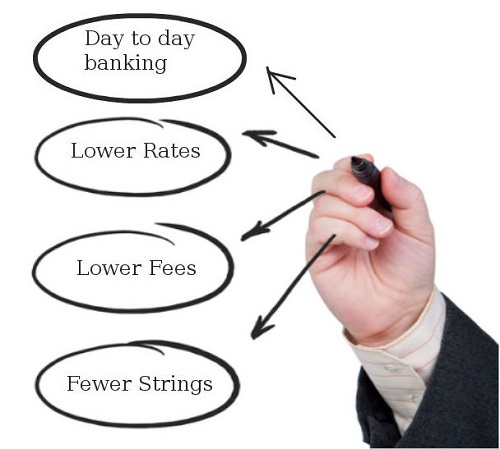If you’ve ever just sat and listened to someone talk about their bank, it’s fascinating how unhappy most people really are. Obviously, day-to-day banking is a necessity in the modern world because you can’t just keep a big safe full of cash in your garage.
However, it isn’t necessary to feel like you’re stuck in a situation with your bank that you don’t want to be in. You want to feel like you mean something and you want to feel like you’re actually building a relationship with your financial institution. Sometimes, those things are best accomplished with a credit union and not a big bank.
The World Council of Credit Unions says that a credit union is a financial co-op that is non-profit and driven by memberships. The organization is owned by its members, and it provides a variety of financial services to those members. Here are some of the advantages that credit unions have over the standard bank.
Day-to-Day Banking
Everyday banking services are commonplace at all credit unions and at banks, but the membership aspect of a credit union gives them a more personal feel. In most cases, it’s the difference between feeling like a customer and feeling like a member, because that is actually true. It’s not uncommon to feel rushed along so they can get to the next customer when you’re in a bank. And even though it seems like a bank has a lot more services to choose from, most credit unions offer all the same types of services. These include chequing and savings accounts, specialty accounts, basic withdrawals and deposits, complete online banking services, debit cards, credit cards mortgages, personal loans and foreign currency exchange.
Credit unions also offer the same kinds of business services that banks offer, with the same personal membership appeal. These services typically include start up loans and business financing, daily business banking solutions, business growth strategies and solutions, payroll programs and strategies, retirement programs, business insurance and group benefits.
Lower Rates
Since a credit union is more or less run by members and is a non-profit entity, they are able to offer loans and similar products at much lower interest rates than a bank. It’s important to keep in mind that a bank is always concerned with profit, and must take necessary actions to grow as much profit as possible. Naturally, this doesn’t include always providing the lowest interest rates possible. Banks might compete with other banks by offering special rates or promotions, but they’ll never be able to consistently offer interest rates as low as a credit union.
Lower Fees
Most people have likely felt the sting of high bank fees at one time or another. This is especially true if you have debit cards and credit cards and loans and lines of credit and online banking. The fees add up and even if you have one fee to cover all of the services, it’s still relatively high. With a credit union, being a member means any profits are passed on to you, and lower fees is one of the ways this happens. For some services, you won’t have to pay any fees at all.
Fewer Strings
Minimum balance requirements are one way that banks tend to make things complicated and add strings to what should be relatively simple activities. Credit unions aren’t usually completely no strings attached, but you can count on things being much simpler and more basic, most of the time. This fact, along with the other benefits of credit unions also leads to a higher general satisfaction rate when compared to banks. Credit union members feel as though they are part of something and that they belong, in part because it is true and in part because of the service they receive on a regular basis.
Banks can’t help striving for profits, because they have stockholders and they are legally obligated to do so. But that doesn’t mean you have to be on the other side of the counter. However, it is good to keep in mind that not every credit union is the same and not all of them are created equal. If you’ve decided to give one a try, take the time to check out the different credit unions in your area and ask a lot of questions. Find out exactly what your membership gets you, how dividends are paid out and if they are paid out, membership fees and anything else you want to know before joining. Once you find the right one, you’ll never want to go back to a bank again.
About the Author: Jonathan Baker is a businessman based in Ontario. Being a businessman he gets to travel a lot and he likes to share his travel experiences with others through blogging. Jonathan also writes about business and finance management. He can be followed on Twitter at @Jonatha97039368.


